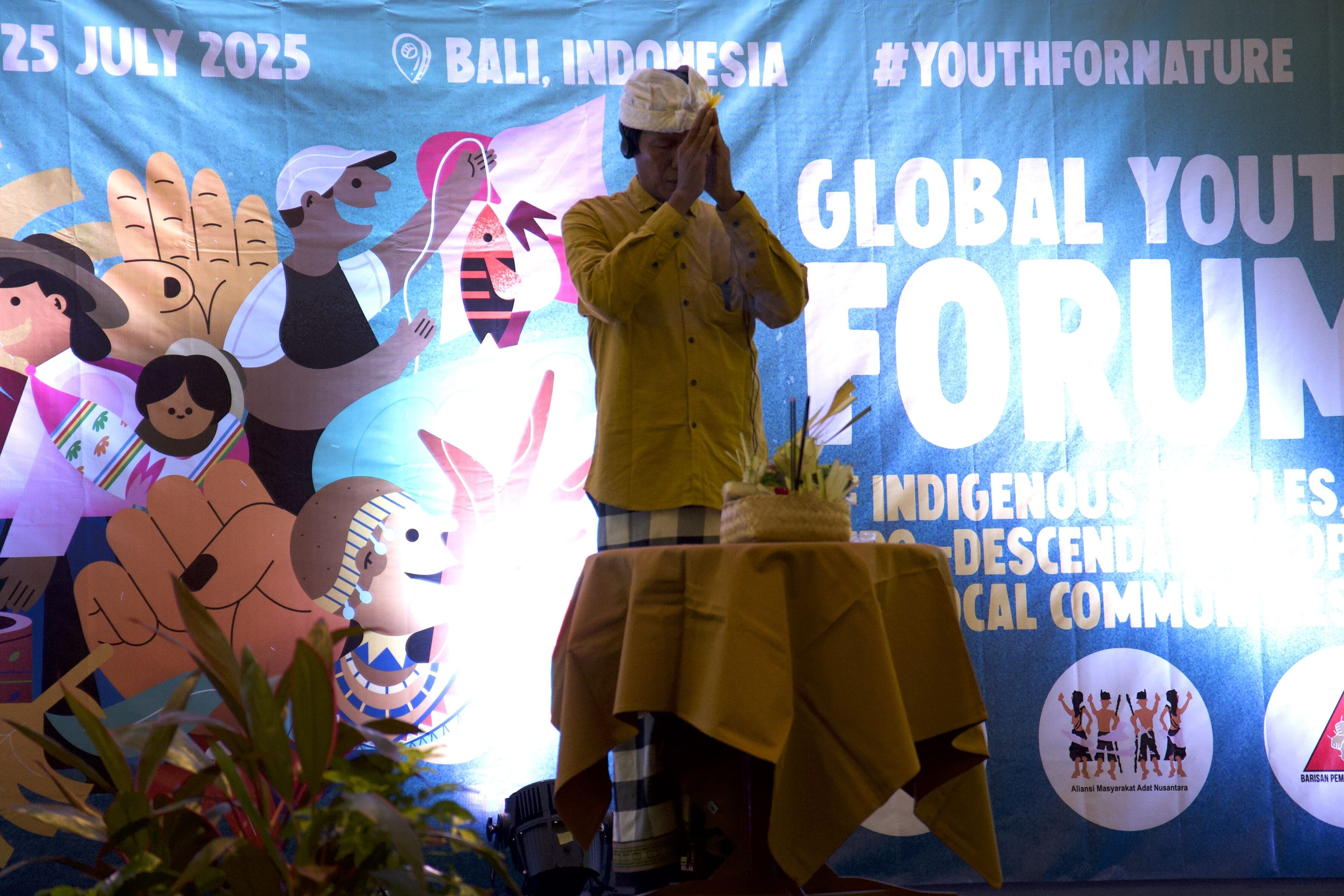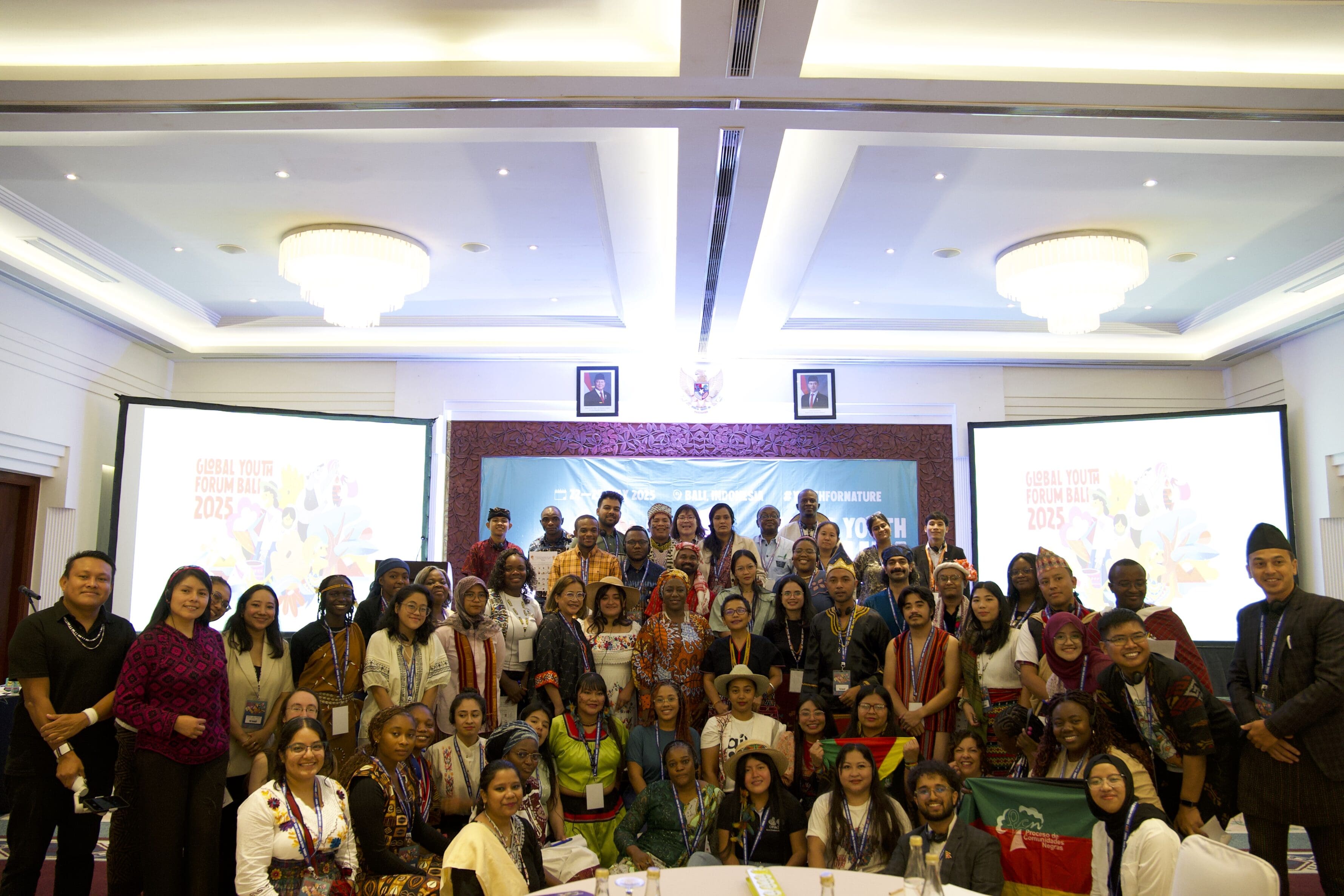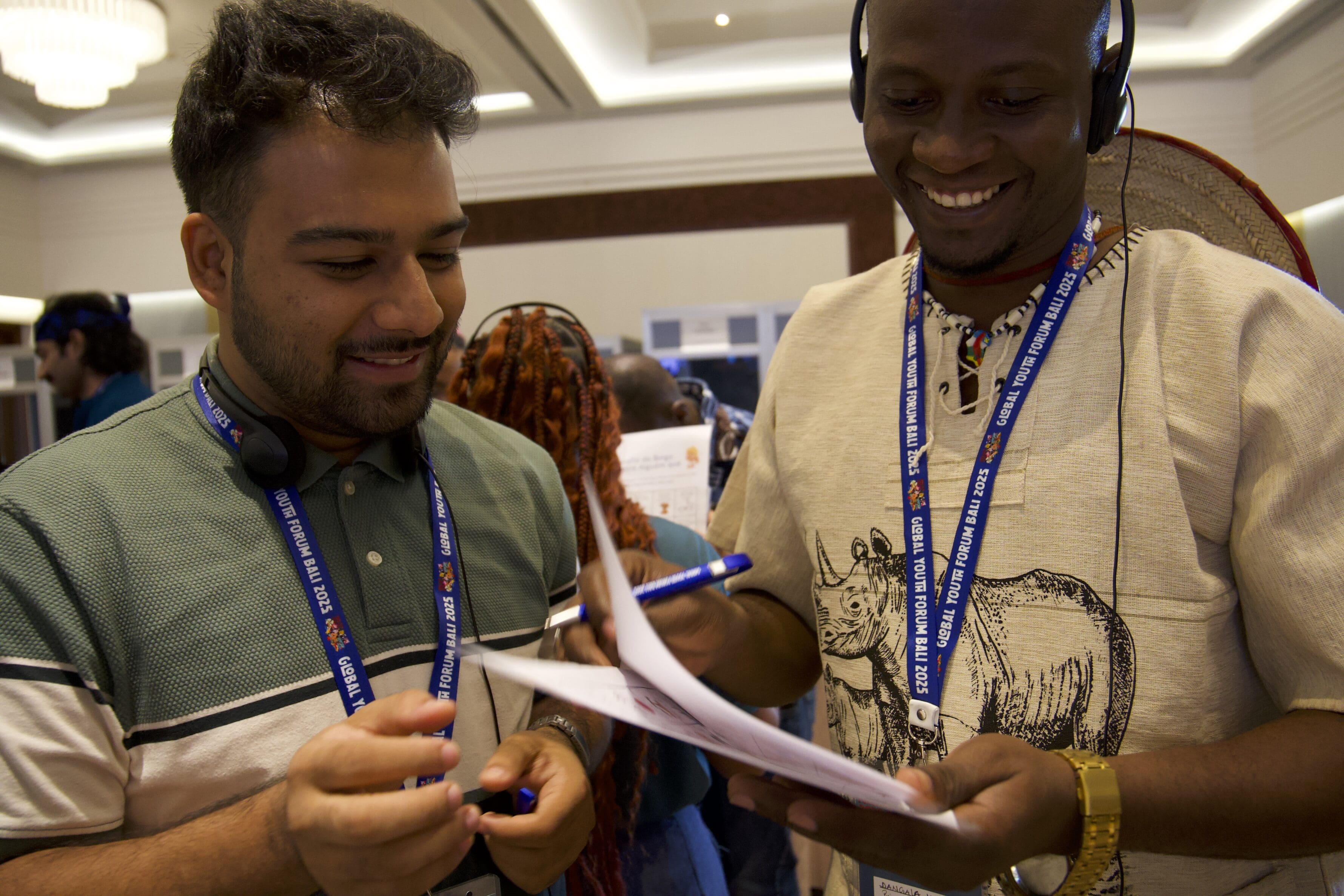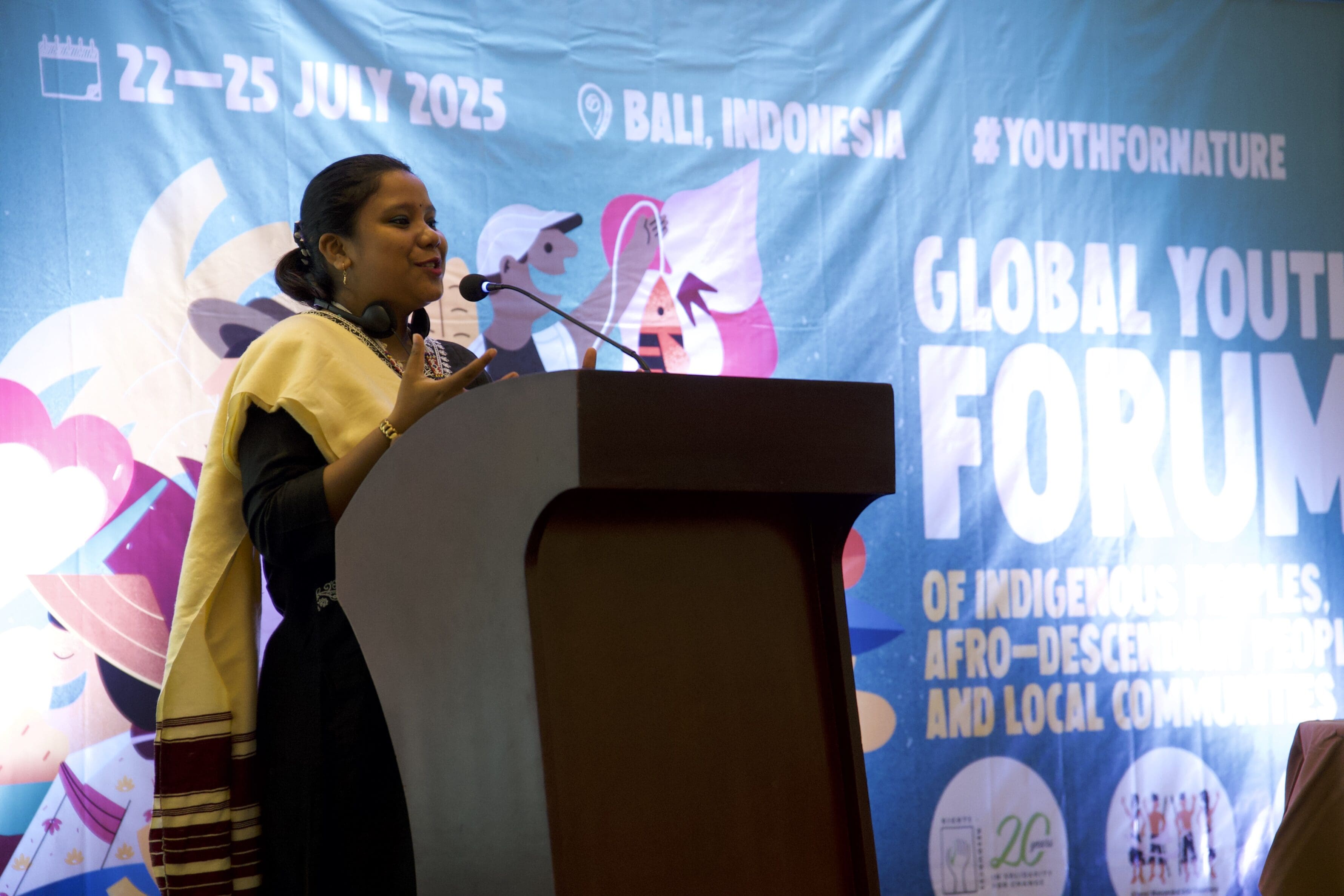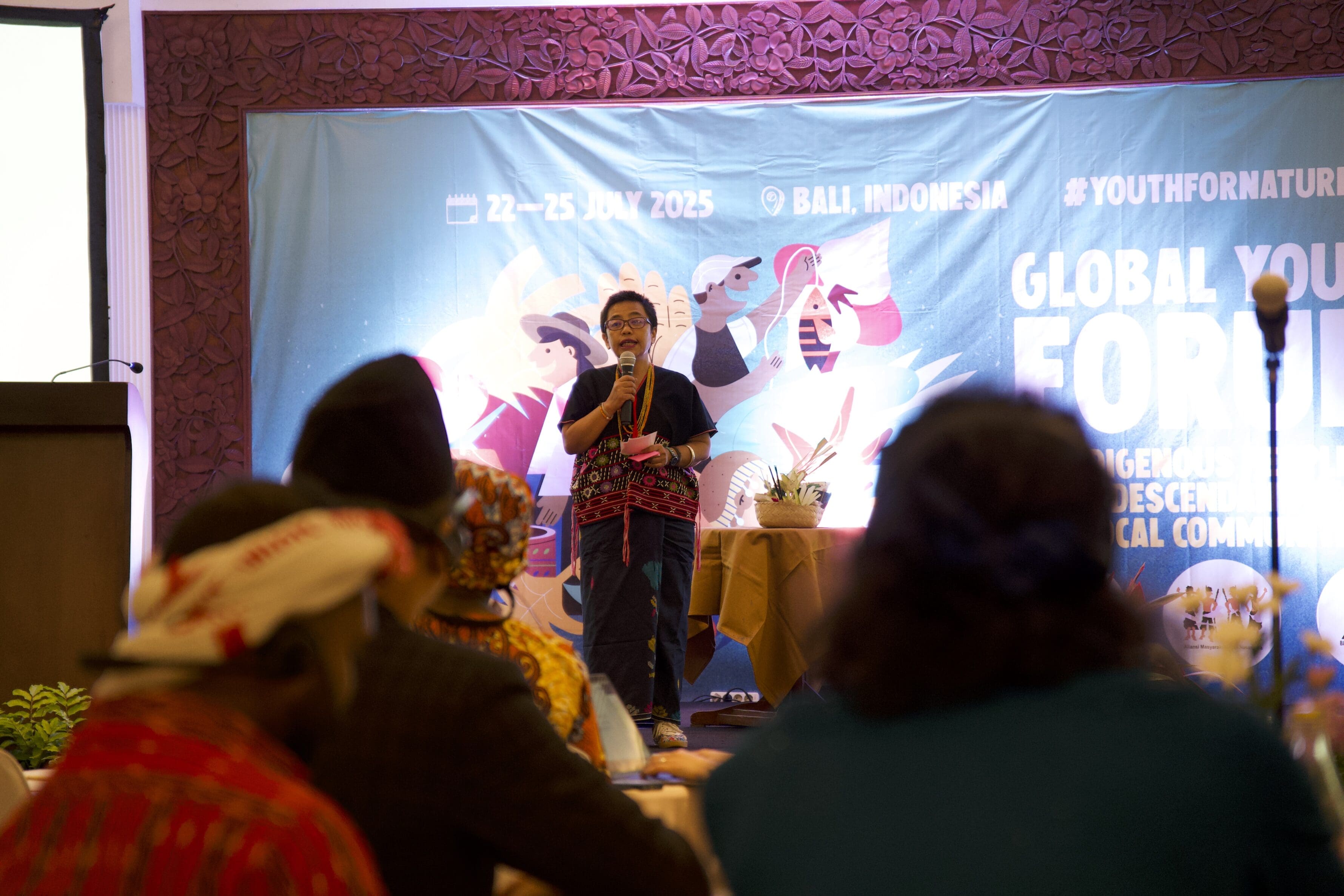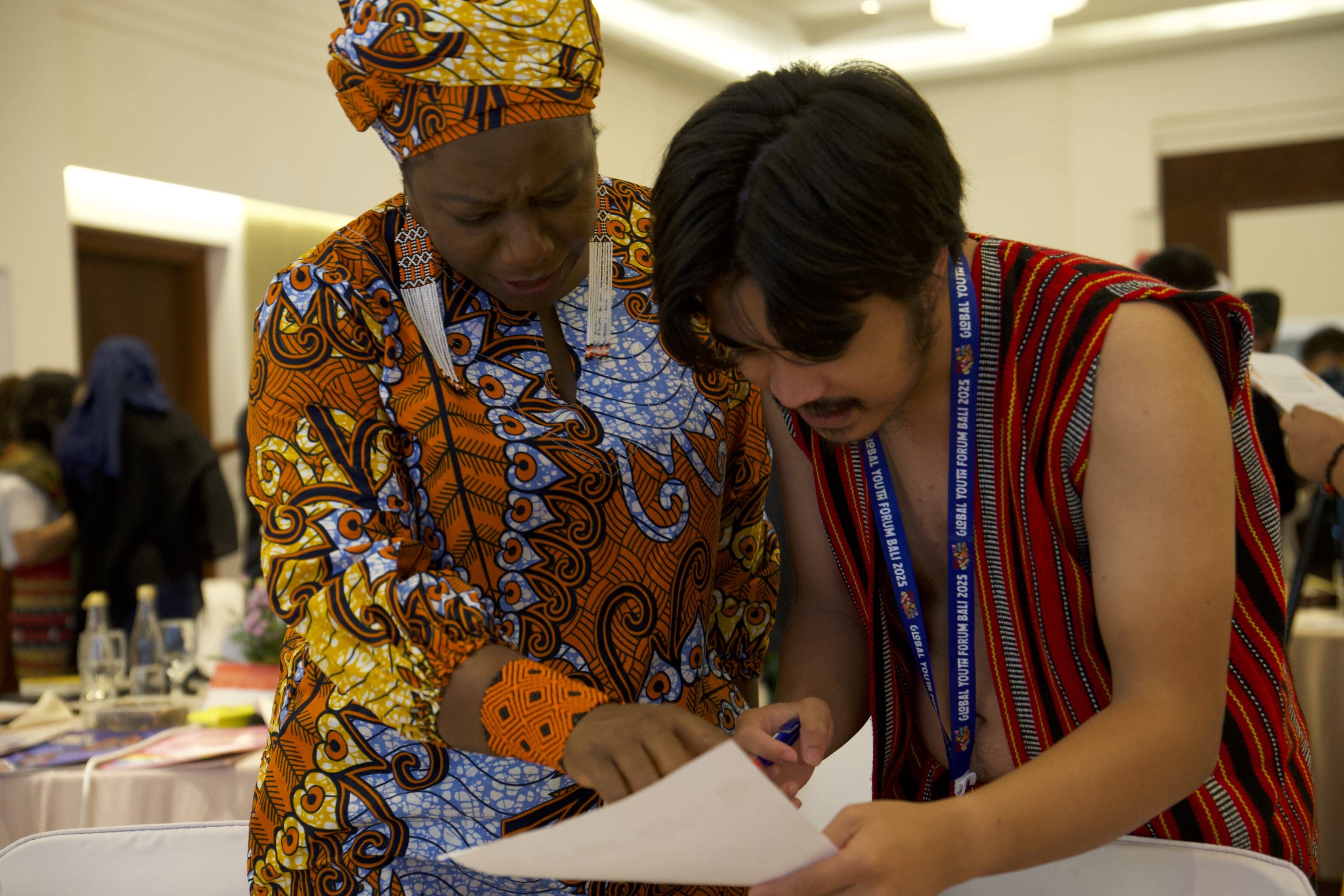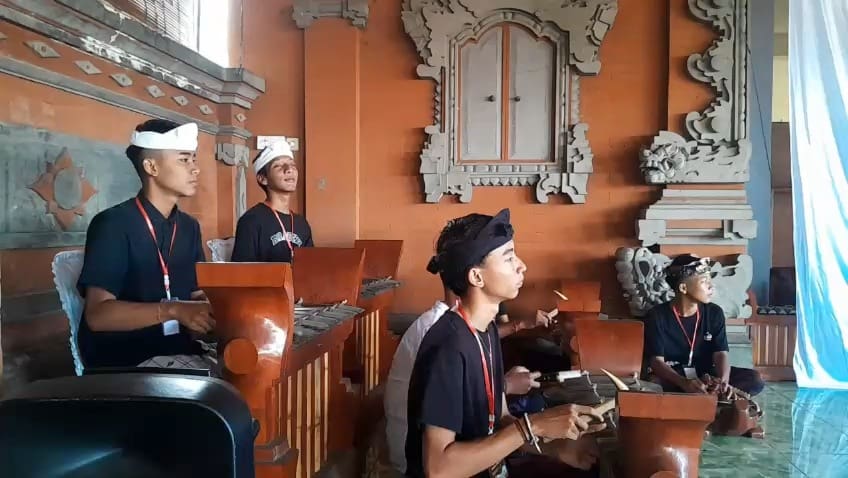Date: 07/22/2025 – 07/25/2025
Location Name: Bali, Indonesia
Co-hosts: RRI, the Barisan Pemuda Adat Nusantara (BPAN), and the Aliansi Masyarakat Adat Nusantara (AMAN)
Let’s explore and reclaim the meaning of youth leadership anchored in the core values of rights, stewardship, and sustainability. Now, at COP30, and beyond, listen when youth speak!
Youth from Indigenous, Afro-descendant, and local communities worldwide are stepping up to defend their lands, livelihoods, and ancestral knowledge. However, they continue to face considerable difficulties, including unequal access to resources, fragmented and uncoordinated efforts to advance their interests, and a pressing need to strengthen their leadership and advocacy capacities. To address these gaps, RRI, the Barisan Pemuda Adat Nusantara (BPAN), and the Aliansi Masyarakat Adat Nusantara (AMAN) will co-host the first-ever Global Youth Forum (GYF) in Bali, Indonesia, on 22–25 July 2025.
This Forum will convene 50 young leaders from Indigenous Peoples, Afro-descendant Peoples, and local communities who are part of RRI’s global coalition. They will explore the role of youth in driving transformative change across community lands and forests.
Youth and elders from Asia, Africa, and Latin America will exchange experiences to reflect on the challenges and opportunities of youth leadership and collectively set an agenda to advance their priorities in defending their territories, cultures, and livelihoods.
The GYF is part of RRI’s efforts to intentionally support youth leaders from within the coalition to create a strong new generation network advocating for customary land rights.
Jump to the summary of the event:
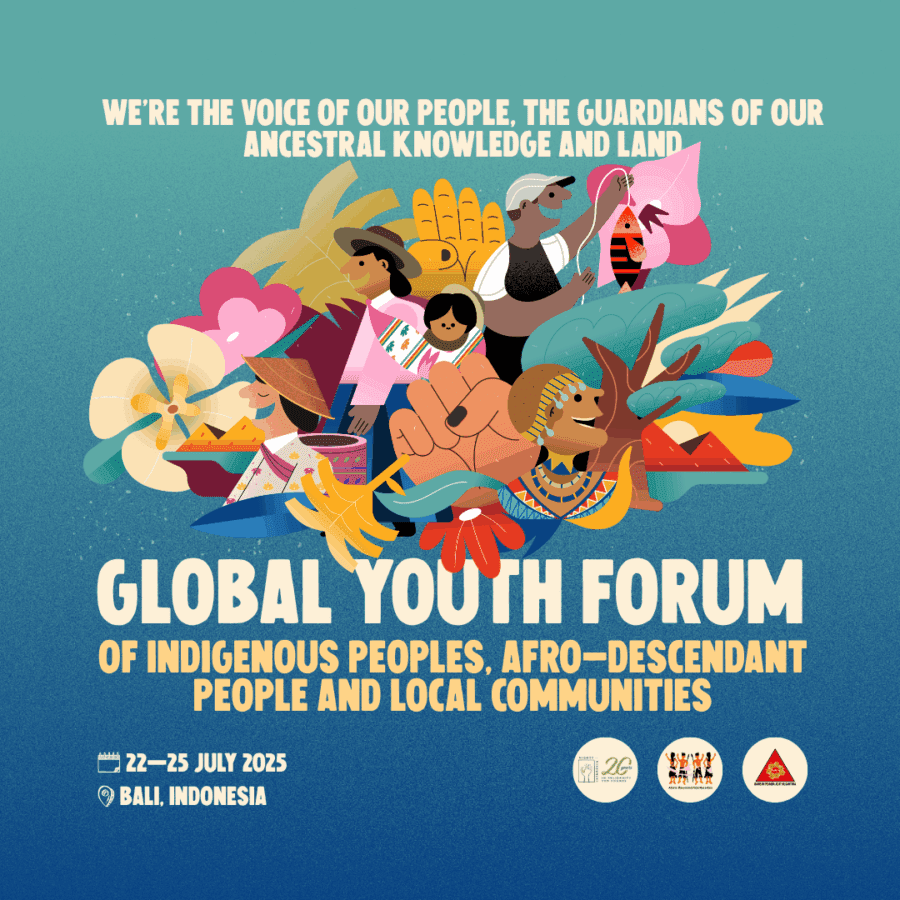
Download the Agenda
Find the Press Release Here
Event Pictures
Day One: A Collective Call to Action Rooted in Ancestral Wisdom
Bali, Indonesia | July 22, 2025 –The first day of the Global Youth Forum opened with a powerful spiritual ritual called Pejati led by Pak Jro Putu Serenga. It honors Balinese traditions, grounding participants in sacred connection to land and ancestors.
Emceed by Archana Soreng, Youth Advisor 2020-2023, United Nations Secretary General’s Youth Advisory Group on Climate, the Forum began with a poignant question: “What does the collective of global youth look like?” Her answer echoed throughout the day: “We’re here as one. As a global youth coalition.”
A unified message from elders and allies
In opening remarks from Hero Aprila (BPAN), Rukka Sombolinggi, General Secretary of AMAN, and Solange Bandiaky-Badji, president and coordinator of RRI, emphasized unity, identity, and intergenerational responsibility. Rukka urged youth to reconnect with their territories, challenging the belief that success is only found in cities. She reminded participants, “We are the future of our knowledge and territories.”
Solange Bandiaky-Badji reinforced RRI’s commitment to youth leadership:
“The Global Youth Forum is a milestone in placing youth as key actors of global solutions—solutions rooted in ancestral knowledge, collective rights, and climate justice.”
Understanding our world: What are youth perspectives on today’s challenges?
In the first panel, youth leaders from the Democratic Republic of the Congo, the Philippines, Liberia, and the Guna Ayala community from Panama shared regional perspectives on today’s pressing challenges. These included land rights violations, displacement, discrimination based on culture and age, climate change, and cultural erosion.
“Youth live in that fine line between technology and ancestral knowledge,” said Funa-ay Claver (AYIPN, Philippines).
“We are not victims—we are the solution,” affirmed Yaily Nadir Castillo, Guna youth leader.
Intergenerational dialogue: Building power together
The second panel brought together Indigenous elders and youth advocates across generations. Speakers like René Ngongo (DRC), Rukka Sombolinggi (AMAN), America Anayelli (GATC, Mexico), and Dario Solano (RedAfros, Dominican Republic) called for bold leadership rooted in collective structures and historical memory.
“Trusting youth is a form of resistance,” said Kim Falyao (Siklab, Philippines Indigenous Youth Network).
“We must be bold, wise, and build true alliances,” said Rukka Sombolinggi (AMAN).
“Young leaders cannot remain passive in the face of the abusive exploitation of land and natural resources,” affirmed René Ngongo (DRC). He sees this as a vital part of intergenerational responsibility—empowering youth to engage in policy, challenge systemic injustice, and correct the governance failures passed down by previous generations.
A shared agenda for a global generation
Throughout the day, participants began identifying shared priorities and defining their narratives using words like unity, hope, interconnectivity, and territories to describe the Forum.
Day one ended not with final answers, but with collective resolve. As Anjatiana Radoharinina (AIKA, Madagascar) reminded everyone:
“We are not the leaders of tomorrow. We are the leaders of today.”
Day 2: Youth Confronting Climate Change, inequality, and discrimination through Innovation, Tradition, and Bold Leadership
By Bambang Sutrisno from KATA with inputs from Daiana González, RRI
Bali, Indonesia | July 23, 2025 – Day Two of the Global Youth Forum (GYF) brought a renewed sense of purpose among the 52 young leaders from 27 countries. From creative financing strategies to traditional knowledge preservation, the conversations reflected the depth, urgency, and innovation that Indigenous, Afro-descendant, and local community youth bring to global challenges.
The day opened with an inspiring reflection by Archana Soreng (Kharia Tribe, India). She described us as children of the river who came alone yesterday, and that now conforms to one big river.
“Today feels like a garden filled with flowers—each of us brings our colors, stories, and challenges, but we choose to grow together,” said Archana Soreng.
Her poetic words were followed by the recorded message from Dario Solano of RedAfros, Dominican Republic, who called for equal, intergenerational, and youth-centered dialogue without hierarchy, where youth voices were not only heard but led the agenda.
“We live within an adult-centric perspective without ears or language to reach young people. A conversation must be created between equals, without hierarchies, to establish a true dialogue.”
Regional priorities, shared visions: What are our current initiatives, innovations, and breakthroughs?
Participants were divided into five groups according to priority and discussed what had been done and innovations started in their respective communities and organizations. They identified five key priorities common across continents:
- Land and Human Rights:
-
-
- Young people are often at the forefront of protecting customary lands, but are vulnerable to criminalization.
- Youth defenders need a system of protection and solidarity across countries.
- Youth-led community documentation is needed to strengthen land rights claims.
-
- Financing Youth Initiatives:
-
-
- Many youth initiatives have great potential but are not sustainable due to limited access to funding.
- Young people need to build networks, create powerful narratives, and learn to develop long-term funding strategies.
- Donors must listen to local needs and shift from a top-down approach to true partnerships.
-
- Climate Justice:
-
-
- Inequalities in responsibility for and impact of the climate crisis are stark—indigenous and local youth are on the frontlines.
- Nature-based solutions and ancestral knowledge must be recognized in policy.
- Youth political leadership is needed to fight for a just energy transition.
-
- Education and Indigenous Knowledge:
-
-
- Formal curricula often erase cultural identities—there is a need to decentralize and recognize community-based education.
- Youth involvement in designing locally-based education is essential.
- Intergenerational learning is key.
-
- Youth Leadership:
-
- Representation does not mean participation—young people need decision-making spaces and mentorship.
- Collective and community-based leadership models are the strength of the movement.
- The leadership of young indigenous women must continue to be nurtured.
Youth delegates shared breakthrough initiatives and successful models in climate justice, education, and financial self-determination:
- Using fashion, art, and community exhibits to raise climate awareness.
- Launching crowdfunding campaigns to support communities facing climate disasters.
- Creating artisanal workshops to preserve ancestral skills while generating income.
- Advocating for financial structures that allow youth to create and manage their funds.
- Documenting traditional knowledge and building Indigenous-led schools focused on culture, sustainability, and forest stewardship.
Challenging the status quo in funding
A special panel with Dr. Solange Bandiaky-Badji (President and Coordinator of RRI) and Jenifer Lasimbang (IPAS Fund, Indonesia) provided a strategic space to discuss the most fundamental issue in the sustainability of youth movements: funding.
Solange emphasized that:
“Donors don’t give out of pity. This relationship is a strategic partnership. Young people must have clear strategies and roadmaps, both five-year and annual, to show the direction of their struggle.”
She also emphasized the importance of developing a global youth strategy across regions as an advocacy tool, so that the voices and needs of young people from Africa, Asia, and Latin America are heard as a collective force.
Jenifer Lasimbang added that:
“Confidence is key. We often feel unworthy of entering the funding space, even though we have a bolder vision that is closer to the community.”
Jennifer encouraged young people to:
- Practice delivering pitches with strong and contextual narratives.
- Open up spaces for financial learning, including financial literacy and donor mapping.
- Build equal partnerships, not relationships between “recipients” and “givers.”
The session also ended with a 2-minute pitch exercise where participants were asked to present their project ideas for both internal and external funding schemes. This was a real-life exercise in voicing initiatives strategically and persuasively.
“The panorama of finance has changed drastically. Youth is not seen as a priority by many donors. But we must be bold. Knock on doors. Pitch your ideas. Convince them that your work matters,” said Solange Bandiaky-Badji.
Youth leaders echoed concerns about inaccessible language and bureaucratic barriers:
“Founders speak a high language that we still can’t reach,” noted Dalila Pérez of ACOFOP, Guatemala.
Still, youth remained grounded in their principles:
“We don’t want to be donor-driven. We should stick to our values and educate the finance space,” said Archana Soreng.
Following the pitches, participants took part in an exhibit of successful youth-led initiatives. They shared the tangible outcomes of projects they are leading or supporting within their organizations. The exhibit showcased the creativity, effectiveness, and passion driving this new generation of advocates, from community education programs to climate justice campaigns.
This space became a platform for mutual learning, inspiration, and strengthening solidarity across continents.
“I’ll always be the cheerleader of the youth,” said Jenifer in closing. “This is a great platform to keep building each other up.”
The second day was about strengthening the movement’s roots. We not only agreed on priorities but began to weave strategies and build collective awareness that change cannot be postponed. As youth reflected on the importance of rooted, respectful, and radical leadership, it became clear: this generation is not waiting for permission to lead—we are already doing it.
Day 3 : Immersing in the Sacred Waters and Wisdom of Pedawa and Penuktukan Village
From the sugar palms and sacred springs of Desa Adat Pedawa to the salt fields and forest sanctuaries of Penuktukan, Day 3 of the Global Youth Forum brought youth leaders from 27 countries deep into the living wisdom of Bali’s Indigenous communities. These field visits offered a great opportunity for intercultural exchange and learning from Balinese ancestral practices—where land, water, gender, spirituality, and resilience are deeply interconnected.
Sacred knowledge in Pedawa: A journey through forests, rituals, and learning
Bambang Sutrisno (KATA Indonesia)
We traded our conference lanyards for sarongs and stepped into one of the oldest Bali Aga villages—Pedawa. Known for its strong commitment to ancestral traditions, Pedawa welcomed us with open arms and sacred rituals.
Before entering the village hall, we joined the Meseban ceremony—a purification ritual meant to cleanse the soul and open the spirit to new learning. The warmth of the welcome was matched by sweet traditional snacks—senggait (a mix of local potatoes and Pedawa sugar) and boiled bananas—and a graceful performance of the Sekar Jagat dance, a prayer for peace and harmony.
Mr. Sudiastika, the Kelihan Adat (Traditional Leader), emphasized the importance of intergenerational exchanges, expressing his hope that the youth of the world would carry
Sudhamala Gelunggang: Sacred water for a cleansed soul
Our visit to the Sudhamala Gelunggang spring was unforgettable. This sacred water source is used not only for daily needs but also for ritual purification.
In response, the Pedawa Community launched a conservation initiative in 2016. They began planting native trees like ficus ara, which absorb rainwater and slowly release it during the dry season—a form of climate resilience rooted in Indigenous science.
“Water is life. If we destroy water, we destroy life itself,” said Pak Wayan Sadana, local leader
Before leaving, each of us planted a Ficus tree by the spring—a gesture to help preserve this sacred site for future generations.
Thoughts by Nkuli Mola Elnathan (Support Center for the Promotion of Women and Young Girls, DRC)
This day was rich with emotion. I felt at home in Pedawa. We were warmly greeted by the community and their traditional leader, who shared with us the spiritual and ecological significance of their ancestral forest.
We walked the forest trails with Mr. Pajero, the community elder, who reminded us that the forest is not only our heritage, but it is the mirror of our identity as Indigenous Peoples.
“This visit took us away from the city and reconnected us with nature, rituals, and the sacredness of land. It reminded us that protecting forests is an act of protecting culture.”
Voices from the Global South: Youth reflections
“We saw a highly organized and developed community. In our own communities, not many speak English. We must strengthen our capacities like they did. I also saw how they use for their rituals the same flowers as we do for Día de los Muertos—cempasúchil, which is the flower that calls the spirits of our relatives who have passed away. This cultural resonance was powerful.” — Maria Guadalupe Ramirez, Red MOCAF, Mexico
“In Colombia, industrial sugar production often causes dispossession. Here, we saw palm sugar being produced in harmony with nature. That’s a lesson we must carry home.” — Daniela Carabalí, Proceso de Comunidades Negras (PCN), Colombia
“We visited a sacred waterfall that’s still used for rituals. It’s not just tourism—it’s managed by the community with clear rules. This is what true community-led tourism looks like. There are many learnings on their governance model that we should bring to our own territories” — Hero Aprila, Barisan Pemuda Adat Nusantara (BPAN), Indonesia
“We explored a farming system unlike any I’ve seen in Nepal. I saw our shared history in their architecture and agriculture. This trip reminded me that our societies have been connected since prehistoric times. It inspired me to dig deeper into our interconnected past.” — Hemanshu Kafle, International Forestry Students’ Association (IFSA), Nepal
“Visiting a traditional house brought my soul back 20 years. It looked like my own home, and I felt like I gained a new family in that village. Everyone was deeply connected. It was beautiful.” — Blen Romam, Asia Young Indigenous Peoples Network (AYIPN), Cambodia
It was a special and unique day. We were immersed in the heart of nature, far from the luxurious venues and the city center. We had time to visit this very sacred place. We connected with nature through customary rituals and the management of these sacred sites for the good of our communities.
This community visit was more than a visit—it was a reminder that hospitality, heritage, and harmony with nature can shape a resilient future.
Pedawa and Penuktukan taught us that protecting water is protecting life. And to protect life, we must honor our connection to the land, the spirit, and each other.
Day 4: Youth Power in Motion: GYF 2025 Closes with Vision, Voice, and Action
On July 25, the Global Youth Forum in Bali closed with a powerful celebration of identity, collective purpose, and the base for creating a youth roadmap for the future.
Honoring Afro-descendant women’s leadership
The day began with a moving testimony from Alejandra Palacios Espinoza of Fundación Azúcar (Ecuador) on the International Day of Afro-Latin American, Afro-Caribbean, and Diaspora Women:
“Our presence in these international spaces is resistance, advocacy, and political affirmation. Today we reaffirm that Afro-descendant women not only resist: we also lead, we also dream, we also transform.”
— Alejandra Palacios Espinoza
Her words echoed across the room, uplifting the voices of Afro-descendant women and placing ancestral memory and leadership at the heart of the global youth movement.
Building a youth-led roadmap for climate and land justice
Throughout the day, youth leaders from Asia, Africa, and Latin America co-created the foundations of a global roadmap—a living document to guide collective action beyond the Forum.
Some of the key priorities identified include:
Land and Human Rights
-
- Launching a Global Youth Coalition of Indigenous Peoples, Afro-descendant Peoples, and local communities.
- Creating a common advocacy paper to influence international processes.
- Strengthening capacity on human rights instruments and legal defense.
- Establishing a rights observatory and sharing the Latin American Youth Manifesto globally.
- Launching a Global Youth Coalition of Indigenous Peoples, Afro-descendant Peoples, and local communities.
Climate Justice
-
- Mobilizing stronger youth involvement in forest and territory protection.
- Ensuring genuine youth representation in climate platforms.
- Driving consultations and actions ahead of COP30, followed by global campaigns post-summit.
- Mobilizing stronger youth involvement in forest and territory protection.
Youth-Led Finance
-
- Designing fair mechanisms to directly fund youth initiatives.
- Establishing the CLARIFI Youth Fund, supported by RRI and partners.
- Creating knowledge-sharing tools on financial sustainability.
- Designing fair mechanisms to directly fund youth initiatives.
Indigenous Knowledge & Education
-
- Developing an Indigenous Peoples curriculum, language dictionaries, and intergenerational learning spaces.
- Promoting traditional food knowledge and government advocacy.
- Organizing exchanges and workshops to preserve and share local knowledge.
- Developing an Indigenous Peoples curriculum, language dictionaries, and intergenerational learning spaces.
Youth Leadership and Movement Building
-
- Investing in youth capacity-building in fundraising, advocacy, and visibility.
- Expanding physical and digital youth spaces across regions.
- Enabling legal recognition and operations adapted to local contexts.
- Investing in youth capacity-building in fundraising, advocacy, and visibility.
Closing with wisdom, hope, and commitment
The final session brought forward heartfelt reflections from partners, mentors, and youth leaders:
“Our common goal is to achieve all that we have planned here. Are you ready to strengthen the global youth movement?” — Hero Aprila, BPAN, Indonesia
“From the beginning, this Forum was built by youth, for youth—and that’s why the outcomes were so powerful.” — Rose Nierras, RRI
“The civilization of our nature will live forever…because this room is full of a generation ready to carry the flame.” — Rukka Sombolinggi, AMAN
“We laughed, we danced, we shared our struggles. We march together like a garden of flowers in all our diversity.” — Archana Soreng, Kharia Tribe, India

